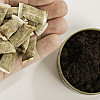Recent Blog Articles

Lead poisoning: What parents should know and do

How does waiting on prostate cancer treatment affect survival?

Does running cause arthritis?

Is alcohol and weight loss surgery a risky combination?

Preventing ovarian cancer: Should women consider removing fallopian tubes?

Healthier planet, healthier people

Is snuff really safer than smoking?

Will miscarriage care remain available?

Considering collagen drinks and supplements?

Does less TV time lower your risk for dementia?
Dry Skin
What Is It?
Normal skin has a soft, supple texture because of its water content. For skin to feel soft, pliable and "normal," its top layer must contain a minimum of 10% water — and ideally between 20% and 35%. To help protect the outer layer of skin from losing water, the skin's sebaceous glands produce an oily substance called sebum. Sebum is a complex mixture of fatty acids, sugars, waxes and other natural chemicals that form a protective barrier against water evaporation. If the skin doesn't have enough sebum, it loses water and feels dry. If environmental factors cause more water evaporation and overwhelm the ability of sebum to prevent water loss, the skin will shrivel and crack.
Dry skin, also called xerosis, is a very common problem in modern societies, affecting people of all ages, even infants. In the United States, most cases of dry skin are related to one or more of the following factors:
To continue reading this article, you must log in.
Subscribe to Harvard Health Online for immediate access to health news and information from Harvard Medical School.
- Research health conditions
- Check your symptoms
- Prepare for a doctor's visit or test
- Find the best treatments and procedures for you
- Explore options for better nutrition and exercise
I'd like to receive access to Harvard Health Online for only $4.99 a month.
Sign Me UpAlready a member? Login ».
Disclaimer:
As a service to our readers, Harvard Health Publishing provides access to our library of archived content. Please note the date of last review or update on all articles.
No content on this site, regardless of date, should ever be used as a substitute for direct medical advice from your doctor or other qualified clinician.
Free Healthbeat Signup
Get the latest in health news delivered to your inbox!
